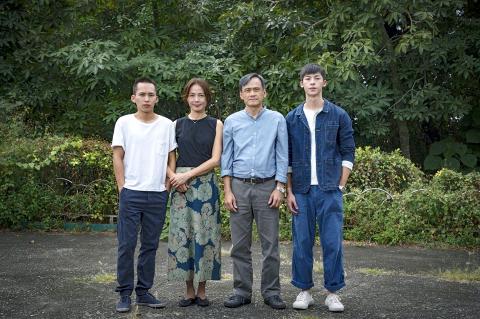In the beginning of A Sun (陽光普照), driving instructor A-wen (Chen Yi-wen, 陳以文) argues with his wife Qin (Samantha Ko, 柯淑勤) about their delinquent son, who is about to be sent to a juvenile correction facility.
“I hope they lock him up until he gets old, lock him up until he dies,” A-wen exclaims.
Of course A-wen isn’t cold-blooded. The complex combination of emotions — anger, disappointment, grief, sadness, love — of a repressed man who avoids facing his feelings by pretending he doesn’t care is evident in that one line.

Photo courtesy of atmovies.com
Qin provides the contrast. She’s the one facing the family issues directly, but she also remains mostly stoic and matter-of-fact, taking whatever life throws at the family even though she’s obviously exhausted.
This kind of family dynamic is fairly common in Taiwanese society. Although every family member deeply cares for each other, they shut each other out and even say hurtful things, often preferring to secretly “help” in ways that cause even more discord. A-wen’s character exemplifies this archetype — frail, crooked and wrinkled but unwilling to bend even a little bit.
The bulk of the action and dramatics revolves around the son A-he (Wu Chien-ho, 巫建和), who is as inept as his father at expressing himself, preferring to solve problems through violence. He frequently says “I’m fine,” when he’s clearly not. Wu also does a superb job with the troubled character’s development over the four years in which the film takes place, serving as a believable catalyst for the entire film’s events.
However, it is Chen and Ko’s subtle yet powerful performances that drive the suffocating tension that carries the two-and-a-half hour film and makes this ordinary story about ordinary people shine. It takes top-notch acting to make such a layered drama work, and the supporting actors such as Liu Kuan-ting (劉冠廷), who plays A-he’s old delinquent buddy and the movie’s “villain,” also hold their own.
This is the latest work by acclaimed director Chung Mong-hong (鍾孟宏), who won a Golden Horse for best director for the 2010 The Fourth Portrait (第四張畫), which is also about troubled youth. The cinematography is rich and vibrant, making masterful use of darkness and light, especially sunlight — whether soft or blinding — echoing the title of the film.
The sun, although warm and life-sustaining, can also burn. What if there are no more shadows to protect us from the burning sun? laments A-he’s handsome and successful elder brother A-hao (Greg Hsu, 許光漢). Although he doesn’t have a major role in the movie, he inadvertently becomes the “sun” that eats up the shadows and forces everything into the open.
No matter how loving a family is, very few can be completely open with each other, each harboring some deep and often dark secret. Sometimes it takes pain and misfortune to expose them, and the family either disintegrates or becomes closer through the process.
Even though the movie is 155-minutes long, there are parts that could have been elaborated on. For example, perhaps A-hao could have had a more prominent role, as his stark contrast to A-he as the family’s “golden boy,” and clearly the father’s favorite, would have made for some interesting development.
Although Qin plays the strong motherly role well, the story is still more about father-and-son as well as the ties between fellow delinquents and gangsters, namely male-to-male relationships. There are also some intriguing female bonds in the story, such as A-he’s young and pregnant girlfriend Xiaoyu (Wu Tai-ling, 吳岱凌) whom Qin takes under her wing, but this part is left largely unexplored.
But that’s just nitpicking. Chung handles the subtleties and complexities of humanity extremely well, and A Sun will probably win many awards come Golden Horse time and leave its mark among the masterpieces of Taiwanese cinema.

Last week the State Department made several small changes to its Web information on Taiwan. First, it removed a statement saying that the US “does not support Taiwan independence.” The current statement now reads: “We oppose any unilateral changes to the status quo from either side. We expect cross-strait differences to be resolved by peaceful means, free from coercion, in a manner acceptable to the people on both sides of the Strait.” In 2022 the administration of Joe Biden also removed that verbiage, but after a month of pressure from the People’s Republic of China (PRC), reinstated it. The American

Chinese Nationalist Party (KMT) legislative caucus convener Fu Kun-chi (傅?萁) and some in the deep blue camp seem determined to ensure many of the recall campaigns against their lawmakers succeed. Widely known as the “King of Hualien,” Fu also appears to have become the king of the KMT. In theory, Legislative Speaker Han Kuo-yu (韓國瑜) outranks him, but Han is supposed to be even-handed in negotiations between party caucuses — the Democratic Progressive Party (DPP) says he is not — and Fu has been outright ignoring Han. Party Chairman Eric Chu (朱立倫) isn’t taking the lead on anything while Fu

There is a Chinese Communist Party (CCP) plot to put millions at the mercy of the CCP using just released AI technology. This isn’t being overly dramatic. The speed at which AI is improving is exponential as AI improves itself, and we are unprepared for this because we have never experienced anything like this before. For example, a few months ago music videos made on home computers began appearing with AI-generated people and scenes in them that were pretty impressive, but the people would sprout extra arms and fingers, food would inexplicably fly off plates into mouths and text on

Feb 24 to March 2 It’s said that the entire nation came to a standstill every time The Scholar Swordsman (雲州大儒俠) appeared on television. Children skipped school, farmers left the fields and workers went home to watch their hero Shih Yen-wen (史艷文) rid the world of evil in the 30-minute daily glove puppetry show. Even those who didn’t speak Hoklo (commonly known as Taiwanese) were hooked. Running from March 2, 1970 until the government banned it in 1974, the show made Shih a household name and breathed new life into the faltering traditional puppetry industry. It wasn’t the first